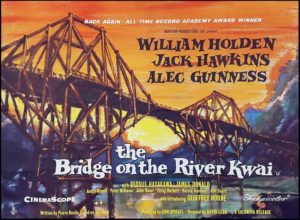1957 London, England
Name of interviewee: David Andrew Smith
Year born: 1952
City/town: North London (Barnet)
Interviewed on September 22nd
by Nelson Ruseler-Smith

I think the first movie I remember seeing is “Bridge over the River Kwai”. It was about British prisoners of war being treated badly by the Japanese, being beaten and left unfed. The Japanese were forcing them to build a bridge, and I think at the end they blow it up. The brutality of the movie was a bit shocking, I think that age restrictions on films didn’t exist back then, I don’t know how I ended up watching it. You saw a lot of films about the war in that period, usually showing British men being gentlemanly and proper and brave.
I must have been around 7 or 8 when at the time, probably an aunt or an uncle took me, don’t think my mother would have shown me such a brutal film. Most likely John or Jean got all the cousins together and took us out for an afternoon.
Alec Guinness’ character comes to mind from the film, it was sort of funny, even though he was a prisoner of war he walked around with a stick and ordered his men to behave. He was dressed impeccably despite the beatings and the underfeedings, a bit unrealistic but a good character. The British were always the ones observing the rules in those films, it was a very black-and-white message. His character was a classic British archetype: proper and gentlemanly, in nice pressed khakis, but also brave and defiant and focused on doing the right thing. Definitely a hero of the story. Later you’d get films that were more critical of war, but at the time we’d just won and you saw a lot of black and white stuff, We were good, the Japanese were bad. It was all a bit propagandist in hindsight, but I remember being very entertained. It was all very thrilling. Now you’ve got movies like Platoon and things like that which do a good job of showing us in the wrong as well, but at the time that wasn’t the sentiment.
We went to the Odeon Cinema in Southgate, I think it had been built in the 1920’s or ‘30’s so it was a big, art deco thing, lucky to have survived the bombings, as the whole area around it had suffered. I doubt it’s still around, but that’s really the only cinema we went to. I think it was just the closest one to our house.
It was always an event to go to the movies, nowadays people go all the time, but back then it was a whole adventure. I think at home we only had a black and white TV, which mainly showed pretty boring BBC type things, so cinema was a wonder to behold. Dramatic, huge and colorful –that was the key– so exciting to see it in color, way more “in your face” than TV. I mean, when I was 10 the “hot” thing to do for your birthday was to get six mates and have your mum take them to the movies. You’d tell all your friends that this Friday your mum would cook something and take you all to go see whatever was on. It would be a big deal for your mum to go about organizing the whole thing. I think that in those days we would have had a “B film” as well that came with our other ticket, so it would end up being a four hour experience. It wasn’t a “oh, what should we do this evening”, it was much more of a treat.
I’m sure there were ushers at theatres but I doubt they were at the Odeon in Southgate. I feel like I would remember that. We probably took a bus to get there, especially if there were a lot of us.
The cinema actually served as an entreé to soda and things like that. I don’t really remember getting them anywhere else besides the theatre as a kid. Oh, and popcorn, of course, that was just a movie thing. That all contributed to the cinema being an event, it just wasn’t normal to have coke or things like that at home, so going to the theatre included all that as well. The popcorn would come in little paper boxes and the coke would come in paper cups. It was truly exciting, like entering a whole other world you’d never seen before.
Films were definitely an entreé to Hollywood for me, I remember seeing “Oklahoma” and sort of being surprised by it all. It was my first real exposure to Americanah, as all the movies came over. I mean for a kid from North London, Oklahoma was pretty different. I remember there’s a song that the girl sings called “I’m just a girl who can’t say no” because Curly is trying to get her to go on a date. It was all very proper though, it’s not about sex or anything like that. She “can’t say no” to a man who shows up in a horse and buggy I think and invites her on a date. Things are much more explicit now. I bet that Bridge over Troubled Water and most British films of that time had been made in Hollywood anyways, but it was still different to see something really American, with cowboys and dances and things.
